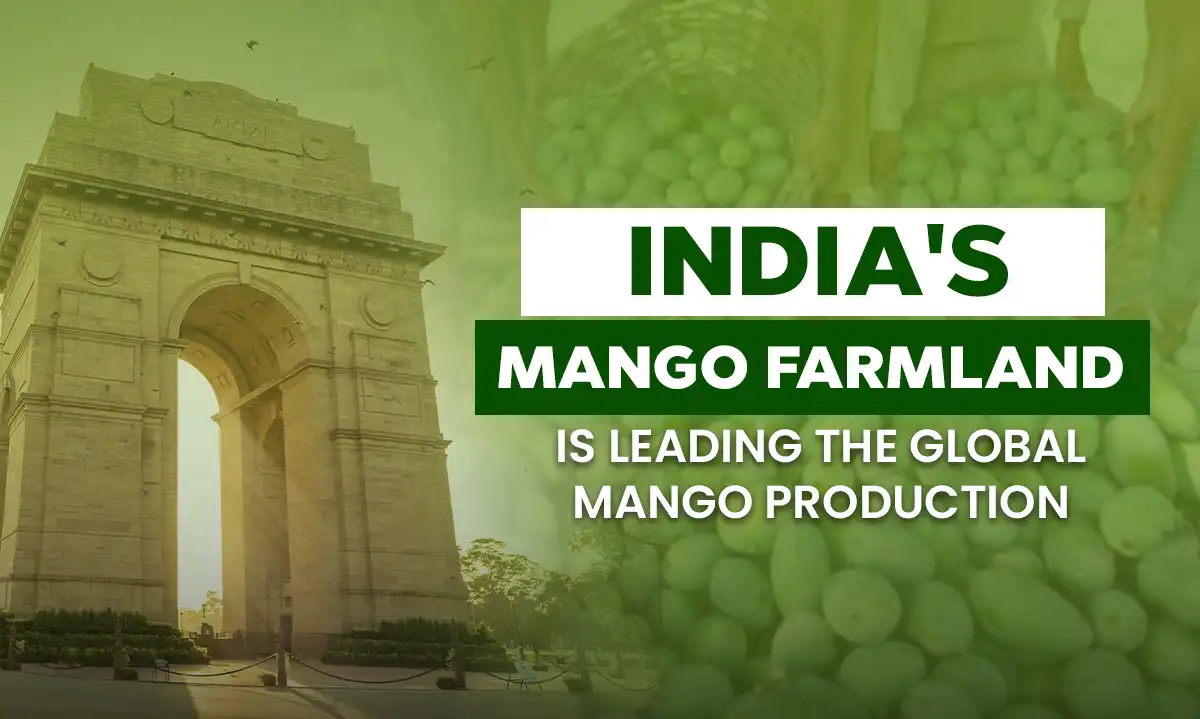India's Mango Farmland: Global Mango Production

Introduction
India stands at the forefront of global mango production, driven by its extensive and fertile mango farmland. The country benefits from a perfect blend of climate and soil conditions that allow for the cultivation of a diverse range of high-quality mangoes. Major mango-producing states like Uttar Pradesh, Maharashtra, Andhra Pradesh, and Gujarat contribute to this leadership, with large-scale farms and advanced agricultural techniques ensuring a consistent and abundant supply of mangoes. This production not only satisfies domestic demand but also supports international markets, making India a crucial player in the global mango industry.
India’s Role as the Top Mango Producer in the World
India is the world's largest producer of mangoes due to its ideal developing climate, vast rural area, and diverse range of mango varieties. The country enjoys perfect conditions for mango development because of its warm environment and assortment of soil types. Large mango-producing states such as Maharashtra and Uttar Pradesh contribute significantly to the production of mangoes, while also setting the standard for developing plans and a wide range of mango varieties, with Alphonso and Kesar emphasizing both yield and quality. India is the primary producer of mangoes worldwide due to its robust product market and the significance of mangoes in Indian culture.
How India's Mango Farmland Sets Global Production Standards
India's mango farmland plays a pivotal role in setting global production standards. The country's mango farmers, with their unique blend of advanced agricultural practices, exceptional natural conditions, and traditional farming methods, set the benchmark for the industry. The ideal growing conditions provided by rich soil and favorable climate across India’s mango farmland support the cultivation of a wide variety of mangoes. Indian farmers utilize a combination of modern and traditional techniques, such as enhanced irrigation systems, pest control methods, and soil improvement practices, to boost productivity and quality. Significant advancements in mango production in key regions guarantee an exceptional and consistent supply. Moreover, India's commitment to meeting global standards for high-quality delivery further enhances its reputation. Together, these elements strengthen India's position as a leader in the mango industry and establish standards for excellence and efficiency worldwide.
India's Mango Farmland: A Global Leader in Quality and Quantity
India's mango farmland is renowned for its exceptional quality and quantity, as well as its extensive cultivation practices and commitment to quality. The country's diverse climate and rich soil provide the ideal environment for producing a wide range of superb mangoes, from the fragrant Kesar to the brilliantly sweet Alphonso. With significant advancements made in major states like Uttar Pradesh, Maharashtra, and Andhra Pradesh, India ensures a reliable and steady supply of mangoes to meet both domestic and international markets. Essential practices, such as advanced irrigation systems, pest management, and farmer training, contribute to the quality and efficiency of Indian mangoes. Furthermore, India's dedication to upholding high standards for quality control enhances its overall influence in the mango market, elevating its mango farms to a prominent position in the global agricultural scene.
The Key Factors Behind India's Top Position in Mango Production
Ideal Growing Conditions and Extensive Farmland: India's diverse climate and numerous soil types provide the ideal climate for mango development. The vast mango farmland across significant states such as Uttar Pradesh, Maharashtra, Andhra Pradesh, and Gujarat contributes to the production of an impressive variety of mangoes. These exceptional conditions foster the growth of a wide range of mango varieties, from popular ones like Alphonso and Kesar to lesser-known varieties.
Advanced Agricultural Practices: India employs a combination of modern farming techniques and traditional methods to enhance mango production. Modern soil improvement techniques, robust pest control systems, and efficient irrigation structures all contribute to increased yield and quality. This integration of innovative and traditional strategies ensures the efficient cultivation of mangoes, adhering to strict standards for both local and global markets.
Focus on Export Quality and Cultural Significance: India's commitment to maintaining high standards for mango quality contributes to its status as a leading producer. Indian mangoes are highly regarded worldwide due to the country’s dedication to meeting global quality standards. Additionally, the economic and cultural significance of mangoes in India generates substantial local interest and enhances their exceptional standing in the market.
India's Mango Farmland is Essential to Global Mango Supply
Large-Scale Production: India is the world’s largest producer of mangoes, with extensive mango farmland dedicated to cultivating a wide range of mango varieties. This large-scale production ensures a reliable and significant inventory of mangoes to meet both domestic and global demand.
High Quality and Variety: Indian mangoes are renowned for their outstanding quality and taste. The country produces a variety of premium mangoes, such as Alphonso, Kesar, and Dasheri, which are highly sought after worldwide for their exceptional texture and flavor. This diversity and quality enhance the overall supply, offering a wide range of options to cater to various market needs.
Export Contributions: Mangoes are a significant export commodity for India, with major shipments heading to the US, Europe, and the Middle East, among other destinations. The consistent production of Indian mangoes influences global supply and strengthens India’s mango farms as a critical hub for international fruit distribution.
Conclusion
India's position as a leader in global mango production underscores the vital role of its mango farmland. The country’s ideal growing conditions, extensive cultivation areas, and commitment to high-quality production methods contribute to its ability to meet both domestic and international demand. By exporting a significant portion of its mangoes to countries around the world, India helps stabilize global mango supply and offers a variety of delicious options to consumers everywhere. This success highlights the importance of India’s mango farms in the global fruit market and their essential contribution to maintaining a steady supply of this popular fruit.
Latest blogs
JOIN OUR COMMUNITY !
Stay connected with Getfarms! Follow us on social media for the latest updates, exclusive offers, and a glimpse into the world of farmhouse living. Join our community today




























